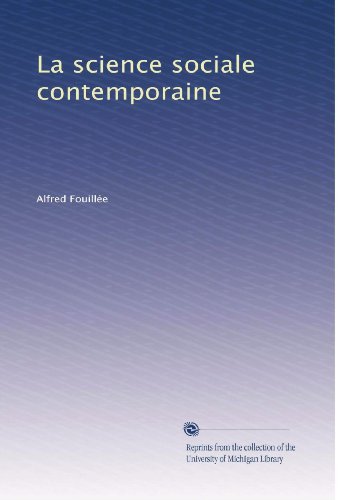Background
Alfred Jules Émile Fouillée was born at La Poueze on the 18th of October 1838.


(This is a pre-1923 historical reproduction that was curat...)
This is a pre-1923 historical reproduction that was curated for quality. Quality assurance was conducted on each of these books in an attempt to remove books with imperfections introduced by the digitization process. Though we have made best efforts - the books may have occasional errors that do not impede the reading experience. We believe this work is culturally important and have elected to bring the book back into print as part of our continuing commitment to the preservation of printed works worldwide. This text refers to the Bibliobazaar edition.
http://www.amazon.com/gp/product/B00387EQIO/?tag=2022091-20
Alfred Jules Émile Fouillée was born at La Poueze on the 18th of October 1838.
Alfred Jules Émile Fouillée held several minor philosophical lectureships, and from 1864 was professor of philosophy at the lycees of Douai, Montpellier and Bordeaux successively. In 1872 he was elected master of com ferences at the Ecole Normale, and was made doctor of philosophy in recognition of his two treatises, Platonis Hippias Minor sive Socratica contra liberum arbitrium argumenta and La Liberte et le determinisme. The strain of the next three years' continuous work undermined his health and his eyesight, and he was compelled to retire from his professorship. During these years he had published works on Plato and Socrates and a history of philosophy (1875).
Fullier is known as an explorer of folk psychology thanks to many works on the spiritual originality of European peoples, especially the French. In 1867 and 1868 he was crowned by the Academy of Moral Science for his work on Plato and Socrates. His other chief works are; L'ldee moderne du droit en Allemagne, en Angleterre et en France (Paris, 1878); La Science sociale con- temporaine (1880); La Propriete sociale et la democratic (1884); Critique des systemes de morale conlemporains (1883); La Morale, Part et la religion d'apres Guyau (1889); L'Avenir de la mitaphysique fondee sur Гexperience (1889); L'Enseignement au point de vue national (1891); Descartes (1893); Temperament et caractere (2nd ed. , 1895); Le Mouvement positiviste et la conception sociologique du monde (1896); Le Mouvement idealiste et la reaction contre la science positive (1896); La Psychologie du people franqais (2nd ed. , 1898); La France au point de vue moral (1900); L'Esquisse psychologique des peuples europeens (1903); Nietzsche et V "immoralisme" (1903); Le Mora- lisme de Kant (1905).
(This is a pre-1923 historical reproduction that was curat...)
During these years Alfred Jules Émile Fouillée had published works on Plato and Socrates and a history of philosophy (1875). But after his retirement he further developed his philosophical position, a speculative eclecticism through which he endeavoured to reconcile metaphysical idealism with the naturalistic and mechanical standpoint of science.
Alfred Jules Émile Fouillée was a member of the Hellenic Philological Society of Constantinople and Académie des Sciences Morales et Politiques.
Fouillee's wife, who by a previous marriage was the mother of the poet and philosopher Jean Marie Guyau (1854- 1888), is well known, under the pseudonym of "G. Bruno", as the author of educational books for children.
